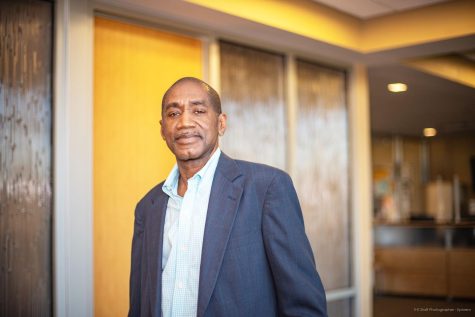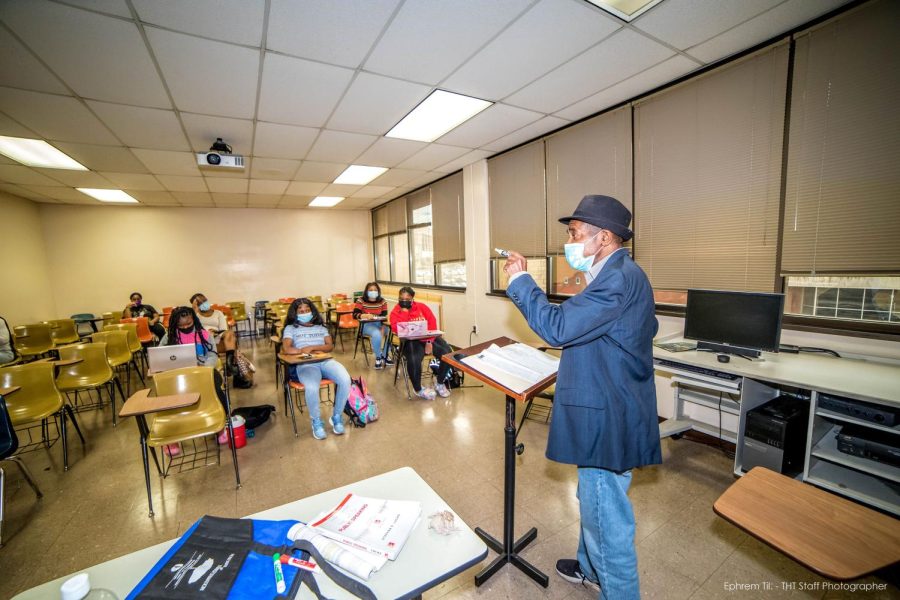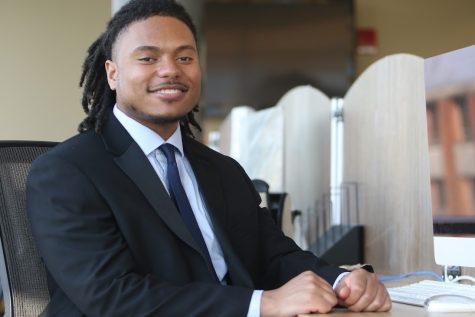Morrison receives prestigious teaching award
Carlos Morrison, Ph.D., who has been employed as a faculty member since 2007, was recently awarded the “Teachers on Teaching” award that is given by the National Communications Association. He said that he did not enter teaching for the money, but to see young people grow. Morrison was educated at University of Alabama at Birmingham, University of Alabama and Howard University.
January 22, 2022
Alabama State University’s own Carlos Morrison, Ph.D., or “Dr. Mo” as he is affectionately called by his students today, was honored by the National Communication Association for his outstanding work as a communication professor, inspiration, and mentor this past November at the NCA 107th Annual Convention in Seattle, Washington. This prestigious honor is a part of the NCA’s “Teachers on Teaching” that discusses the importance of the “total communication classroom experience.”
Morrison, who has been employed at ASU since 2007, has been teaching for almost 25 years. As an undergraduate, he spent his time at the University of Alabama in Birmingham, where he received his bachelor’s in communication arts and mass communication, his master’s degree from the University of Alabama in communication theory and rhetoric, and his doctorate from Howard University in African American Communication and Intercultural Communication.
Morrison describes his feelings after learning he had been selected for the honor.

“To have those within the discipline of communications that I love so much finally recognize me is a highlight for me,” he said.
He goes on to explain that he did not enter teaching for the money but to see young people grow. This mindset is one of Morrison’s most recognizable qualities.
“One of the things that is part of my pedagogy is the use of personal experience, storytelling, and proverbs,” said Morrison. “I’m going to weave in the life lessons with the instructional lessons.” This kind of teaching style allows him to grab his students’ attention and deliver messages to them in ways they can understand.
This style is one that he gained from his time as a student. He learned lessons like his life nuggets, sensitivity to students’ needs, the rhetoric of empowerment, and going above and beyond for his students. He credits some of his professors like John Wittiig, Ph.D., Melbourne Cummings, Ph.D., and Lyndrey Niles, Ph.D., for helping him understand the importance of these things as a student and how he can build on them as a professor.
Morrison’s influence has been felt by so many of his students, both past and present. One of those students is Darion Aaron, the director of the Counter Narrative Project, an LGBTQ+ publication in Atlanta, Georgia. An alumnus of ASU, Aaron was told he was not college material by a community college counselor. It was Morrison who opened his eyes to what his potential could truly be in his first Introduction to Communications class. From being taught life lessons to being helped outside the classroom, Aaron also received help from Morrison with his student LGBTQ+ organization called AMPLIFIED.
“His decision to step into the role of a faculty adviser at my request was met with pushback from some of his conservative colleagues, but Dr. Morrison did not flinch or withdraw his support for another marginalized group on campus,” Aaron said. “Instead, he understood that intersectionality for his Black LGBTQ+ students meant that we’d need to be prepared to fight the threat of racism and homophobia simultaneously.”
Even as Aaron has matured into his professional career, Morrison has continued to provide advice and reassurance through all of his ups and downs. Aaron sums up Morrison’s impact by saying, “Dr. Morrison, I am because you are.”
Celnisha Dangerfield, another student taught by Morrison, is a graduate of Clark Atlanta University and has received a doctorate in communications studies at the University of Memphis. As one of his students, Dangerfield was taken to her first academic conference at the NCA annual conference in Chicago, where she met Ronald Jackson II, Ph.D. Jackson is a past president of NCA and the current program chair of “Teachers on Teaching” for the NCA Seattle, Washington Conference. This was a “life-changing” encounter for Dangerfield and set her up for a bright future.
As an educator in her adult life, Dangerfield demonstrates many of Morrison’s influences on her as a student. She prides herself on engaging with her class in a way that makes them enthused but also keeps her door open for them outside of the classroom whenever they need it.
“When my students see me in the classroom, they really see and hear a lot of Dr. Carlos Morrison in me,” said Dangerfield.
One of the most memorable pieces of advice came at a time when she was questioning her capabilities in school after being out a few years to teach. Morrison simply advised her to go back and reread what she had already written.
“Look back and reflect on your past accomplishments and recognize that they have already prepared you for the season in which you currently find yourself,” Morrison said. This advice allowed Dangerfield to push through and receive her doctorate from the University of Memphis.
Another piece of Morrison’s advice came from Rose Todd, another former student of his from ASU. The advice was that “Every day is a learning lesson.” This advice allowed her to put her journey as a multimedia journalist into perspective and propel her forward despite things not always being perfect. Her “life-changing” experiences with Morrison set her up for her current career as a journalist at Fox 42 in Omaha, Nebraska.
Morrison’s character shines through with his colleagues as well. He and Jackson II have been best friends over the last 30 years. Upon meeting as graduates at Howard, the two did everything together. Their friendship has only gotten stronger with time. They have collaborated on works like “The Appropriation of Blackness in Ego Trip’s The (White) Rapper Show Soul Thieves” (2015).
Jackson raved about Morrison’s abilities saying, “He’s a very talented writer and one of the brightest intellectuals in our field. He has a tremendous dedication to popular culture and particularly how it pertains to African diaspora experiences.”
After being in his classes and seeing just how invested Morrison is in his students, Jackson said, “He’s always thinking and caring about his students whether that’s in the class or not. He is always looking for ways to expand what he’s teaching them. I think the students understand that he has their best interest at heart. He’s not so focused on the material that he won’t ask how his students are doing.”
An example of this sentiment is with another former ASU student of Morrison’s – graduate Staci Jones. When Jones struggled with health issues one semester, Morrison, her adviser, and professor, was by her side the entire time.
“His methods of care and actions of care were just something that really helped me get through that semester,” Jones said.
As with so many of his students, Jones and Morrison continue to have a relationship even after she went on and graduated. He aided her in her transition to the graduate program at the University of Cincinnati and helped her prepare for her interview that determined if she got in or not, which she did very well.
Morrison prides himself on being personable and connecting with his students. By the accounts of just a few of his former students, it looks like he has succeeded in that and then some. He believes he has a calling to go above and beyond for his students and has done so throughout his teaching career. As he gets older, he realizes he is on the back end of his career. Whenever that time comes when he does decide to retire from teaching, he can look back on all the relationships he has formed and the long-lasting impacts he has had on so many lives.
“I’m going to teach as long as the Creator God, who gave me this talent, sees fit for me to teach and educate,” said Morrison. “ When it is time to let it go, I’m not going to have any regrets.”








